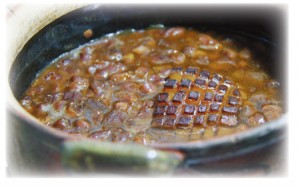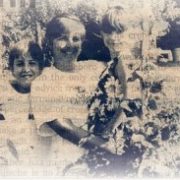Web of Life
For those committed to eating locally grown, sustainably raised food, the South Shore and South Coast of Massachusetts are a slice of heaven. Organic farms dot the land and numerous farmers markets connect growers and customers in a fun, festive atmosphere. Hugging our coastline, the Atlantic Ocean teems with fish and, increasingly, sustainably raised animals graze in our fields. However, just twenty years ago, the picture looked very different. The local food scene often amounted to a card table at the side of the road with tomatoes, zucchini, and blueberries for sale. The remarkable progress that has been made is due, in part, to a few visionary pioneers who, through their example, showed us that change was possible. In 1994 Donna Blischke founded Web of Life Farm located in Carver, and for the past twenty years she has been at the forefront of the local food movement. Inspiring people with her commitment and sharing her knowledge, she has helped the local organic food culture blossom.
As Donna recalls, “I remember twenty years ago when I was starting out, having to explain to people what organic was!”

Travis, Donna, and Stephanie Blischke grow food and grow together at Web of Life Farm.
As is the case with many farmers, Donna’s love of growing food has roots in her mother’s garden. Her mom kept a small garden and was committed to growing with no chemical inputs. As an adult, having children was Donna’s impetus to start her own garden. She recalls, “I wanted to grow food for them that was clean,” and remembers how it struck her that if she sold some extra tomatoes, she could make some money, stay home with her children, and still grow good clean food for them. From there it mushroomed. My, how it has! Donna now actively farms three acres and raises a wide variety of animals. She has also passed her mom’s love of growing food onto the next generation; her daughter works with her at the farm and her son, along with several others, helps out occasionally.
Web of Life is a diverse farm, reflecting Donna’s innate curiosity and belief in the interconnectedness of all species. As she says with a laugh, “I see something, I think it is interesting, and I want to leap into it.” Whether it is an heirloom variety of beans or a breed of goats she just learned about, if something piques her curiosity, it often ends up at the farm. The result? Donna grows a broad array of vegetables and fruits at Web of Life Farm, many of which are not found on other local farms; she also keeps bees, goats, chickens, and turkeys. Barbara Anglin, a longtime local foods activist, notes, “Donna does things no one else does.” And each year, in a nod to her Irish heritage, Donna and her two children also plant potatoes. She relates, “We even have an Irish potato harvesting song and I force them to sing it … every year. Losing tomatoes to blight here on my farm made me think of the horror my family must have felt at seeing the only crop that would ensure their survival through the winter, fail.” Web of Life also boasts a small orchard with apple and cherry trees, as well as Concord grape vines. Donna grows both heirloom and non-heirloom varieties of crops and orchard trees because, as she explains, “I love food with a history.” Some of the varieties she grows, including the Esopus Spitzenburg, reportedly Thomas Jefferson’s favorite apple tree, are listed on the Ark of Taste, (a project of the Slow Food Foundation for Biodiversity that seeks to help preserve foods in danger of extinction).
From the earliest days of the farm, Donna recognized the importance of growing food without pesticides or synthetic fertilizers; Web of Life became a Certified Organic farm in 1994. Today, with organic food readily available, it is easy to forget that just a few decades ago, this commitment was highly unusual. As Donna recalls, “I remember twenty years ago when I was starting out, having to explain to people what organic was!” This type of farming takes commitment, not just to the growing practices but to the paperwork that has to be submitted to the certifying agency. Each area of the farm, including the fields, greenhouses, orchard, mushroom tunnel, and each type of animal, has to be separately certified. Although it is a lot of work, Donna praises Baystate Organics, the certifying organization for Web of Life Farm, noting, “They are a very valuable tool for directing me to the resources I need as an organic farmer–such as which fertilizers or pest control methods are safe and approved.”
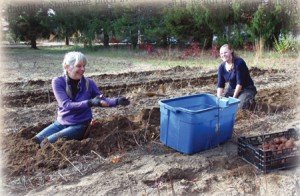
Donna and Steph reap and pitch fingerling potatoes.
As a young girl, Donna learned food preservation skills from her mother and she uses these skills to stretch the harvest, enabling her customers to enjoy local foods long past the end of the growing season. Extra tomatoes are made into sauce or salsa, fruit into preserves, and cabbage into sauerkraut. Donna observed, “If we don’t sell everything at the markets, I will find a way to can or jar it.” She even grows heirloom flint corn that is dried on the stalk and then ground into cornmeal. Donna explained, “a lot of times, cornmeal has been stripped of the good parts of the kernel. Ours is a whole grain product.” Nothing on the farm is wasted–after realizing she wanted to find a use for the hair from her goats, Donna bought herself an old spinning wheel and taught herself how to spin yarn. Several years ago, Amish craftsmen built a beautiful barn at Web of Life Farm that includes a demonstration kitchen and homey sitting area. Donna plans to use this space to offer classes, teaching food preservation skills to others. Donna’s preserved foods are welcome additions to her farm boxes and are also sold at the Plymouth farmers’ market.
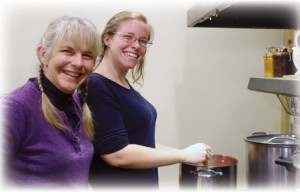
Donna and Stephanie Blischke mix it up making their heirloom staples.
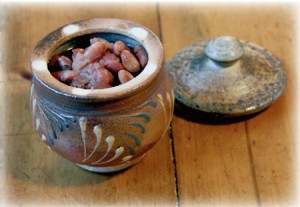
Pottery: Local Pottery Norwell MA
Barbara describes Donna’s work as an “agricultural ministry.” Although Donna is now focusing solely on farming, for years she helped provide access to local foods by running the Middleborough farmers’ market. Donna also shares her years of wisdom with a close-knit group of friends she calls a lovely group of likeminded farmers. . .it is a collaboration, really.
Reflecting on the dramatic changes in local food culture over the past couple of decades, Donna notes with satisfaction, “People are starting to really look at where their food comes from. It is wonderful to hear people asking questions and learning [that] if a product has an ingredient list two paragraphs long, it is not what they should be eating.” In Southeastern Massachusetts, Donna is one of the people we should thank for helping bring about these changes–as Barbara Anglin notes, “it is good to celebrate one of the veterans.”
Web Of Life Farm
71 Silva Street
Carver, MA 02330-1344
(508) 866-7712
www.WebOfLifeFarm.com
